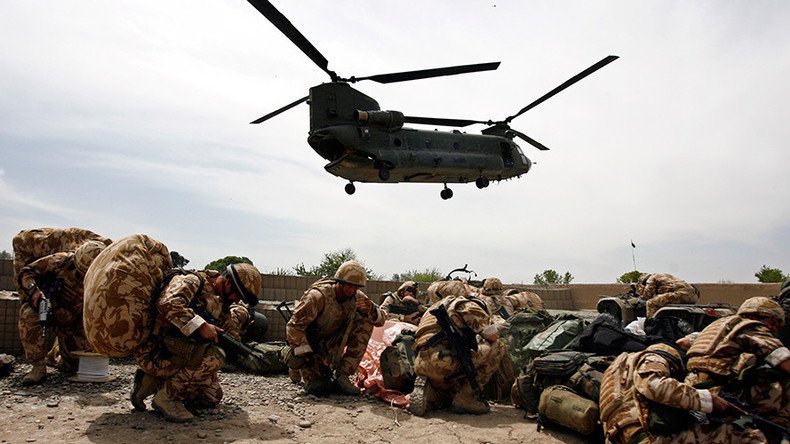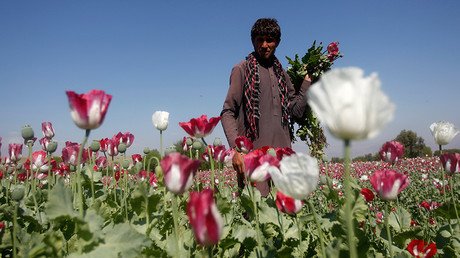No Christmas cheer for many British veterans of Afghan War

The resurgence of the Taliban in Afghanistan, where they have just mounted a major assault in Helmand province in the south of the country, is emphatic evidence that Britain’s 13-year military presence there ended in dismal failure.
As is now the case in towns and cities across the UK, homeless people are a regular fixture in the high street close to where I live. In fact, you can't walk five minutes in either direction without coming across one of these individuals sitting on the ground begging for change.
One of them – let’s call him David – is an ex-soldier. Until recently you would find him sitting on the pavement outside the same mini-supermarket every evening between 4-7 pm, trying to make enough money to pay for a night at a hostel. In front of him he would hold up a piece of cardboard with his army service number scrawled across it, hoping it would garner a more positive response.
David’s story was an all too common one. In his early twenties, with a young wife and two kids to support, he was made redundant from his job after serving his apprenticeship as an auto mechanic. Unable to find work he decided to join the army. He signed up for the minimum term of four years and in that time served four six-month tours of duty in Afghanistan.
The experience left him damaged and unable to cope emotionally and psychologically with normal life once he came out. Eventually, his marriage collapsed and, for want of support from the state and not enough help from the various charities that are set up to help ex-servicemen like him, he ended up on the street.
Recently, he disappeared and I stopped seeing him sitting in his usual spot. I subsequently learned that he was in prison after selling some heroin - heroin that likely originated near the battlefields where he had fought in Afghanistan - to a young girl who died after taking it.
This spiral of despair and tale of wasted young life describes the reality of Britain’s failed military interventions over recent years. In Afghanistan, as with Iraq, young men such as David were thrown into a country they had no business being in to fulfill a military operation that was ill-conceived, poorly planned and altogether disorganized, lacking resources, equipment, and the necessary manpower.
Where Britain is concerned, we are talking war on the cheap, unleashed by Tony Blair after 9/11 to help US president George W. Bush vent revenge on one of the poorest countries in the world. The results, fourteen years later, are all too predictable.
Make no mistake, those Taliban fighters who are in the process of defeating the British and US-trained Afghan military and security forces in Helmand, left behind after British forces withdrew in October last year to deal with the chaos wrought by over a decade of military occupation, are destined to be part of Afghanistan’s future.
They are native born and bred and clearly have wide support among the majority Pashtun population in the south of the country. No, the most grievous indictment of British and US policy is not the resurgence of the Taliban as much as it is the recent emergence of ISIS in eastern Afghanistan. It comes as yet more proof that instead of making the situation better, the presence of British and American troops in the Arab and Muslim world has only made it worse.
At its peak the number of British troops and service personnel in Afghanistan reached 9,500, with the vast majority deployed to Helmand. The number of those killed stands at 456 and over 7,000 injured or maimed. As for Afghan deaths, according to a study published by the Watson Institute at Brown University in the US, 26,000 Afghan civilians were killed between 2001 and January 2015. As for the number injured or maimed, there are no reliable figures available but you can draw your own conclusions.
The only victors to emerge from this military and foreign policy debacle have been corruption and the heroin trade. In October the United Nations Office on Drugs and Crime published its 2015 Afghanistan Opium Survey. It reveals that 66 percent of the country’s opium cultivation takes place in the south - i.e. Helmand. While overall there has been a decrease in overall poppy-cultivation compared to 2014, the number of poppy-free provinces in the country also decreased. In other words, Afghanistan and heroin are now two sides of the same coin.
Guess who's back? British troops have been re-deployed in Afghanistan https://t.co/CsiSnQ7DUjpic.twitter.com/F2iNmnFJpd
— RT UK (@RTUKnews) December 22, 2015Apologists for the US/British/NATO role in Afghanistan point to the achievement in leaving a country behind in which far more people have access to basic medical care and education than they did under the Taliban. While this may well be true the cost in wasted lives and corruption surely undermines it. This is without referencing the inescapable fact that the Taliban are stronger now, today, than they have been since 2001, prior to the invasion and occupation. Here Leo Tolstoy’s dictum that ‘The two most powerful warriors are patience and time’ receives inarguable validation.
Returning to the plight of David, a young man facing a bleak future of perennial despair, those who sent him and thousands like him over to Afghanistan to kill and be killed will no doubt be enjoying their usual sumptuous Christmas. However in a just society they would be the ones in prison and the Davids of this world would be where they belong – at home with their young families looking forward to the future.
The statements, views and opinions expressed in this column are solely those of the author and do not necessarily represent those of RT.














